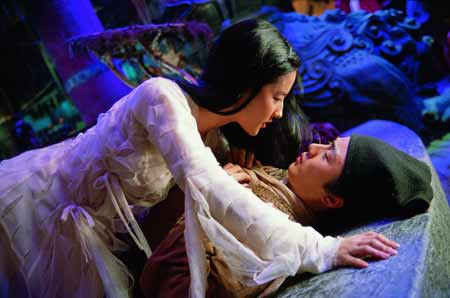A Chinese Ghost Story Redux offers nostalgia
|
|
|
Actors Liu Yifei (left) and Yu Shaoqun in A Chinese Fairy Tale. |
Afraid of the dark? Well, don't be: The all-time classic A Chinese Ghost Story (1987), starring legendary Hong Kong actor Leslie Cheung is less a horror story and more a romance with the other side – think the Chinese equivalent of Hollywood's Ghost (1990). Now it seems that China has caught the remake bug: With A Chinese Ghost Story Redux showing in cinemas since last Saturday and a new version based on the same story, A Chinese Fairy Tale, showing from April 19, it's a box-office battle of the old-but-new.
Literature classic
The two versions are both inspired by the story (and character) Nie Xiaoqian from The Strange Tales of a Lonely Studio, a classic work of literature consisting of about 500 ghost stories collected by Qing Dynasty (1644-1911) author Pu Songling.
Set in ancient China, A Chinese Ghost Story (1987) tells of a young man, Ning Caichen (Cheung), who falls in love with a ghost, Nie Xiaoqian (Joey Wong). A Top 10 Hong Kong movie in 1987 and winner of two Hong Kong Film Awards, since the death of Cheung in 2003 and Wong's retirement, A Chinese Ghost Story (1987) has been hailed by fans and critics as one of China's best films.
To celebrate the 24 years since its release, director Siu-Tung Ching and producer See-Yuen Ng are presenting the remastered, or redux, version on the big screen again. The work took them a year.
"It was all shot on film… a lot of the color and sound has been lost. The color adjusting alone took half a year, and 5.1 Dolby sound has also been added," explained Ng.
The new version is showing nationwide in both Putonghua and Cantonese.
 |
|
Leslie Cheung (left) and Joey Wong in A Chinese Ghost Story Redux. Photos: CFP |
Recalling the memories
Chinese cinema is, in recent years, known for repeating classical stories and lacking fresh ideas. Ever since Wong Kai-wai's Ashes of Time (1994) was re-released two years ago to a 43 million yuan ($6.61 million) box office, remastering the classics has become standard practice to gain easy profit.
"Leslie once told me his favorite work is A Chinese Ghost Story. Remastering it is in memory of him," claimed Ng at the press conference recently. A Chinese Ghost Story Redux and Ashes of Time Redux both starred Cheung and are dedicated to him.
"It is obvious that Cheung's reputation and great fan base can bring audiences to cinemas. Choosing Leslie's films to be the first [for remastering] is safe," film critic Huang Liang told the Global Times.
More are on the way, however, and most will piggyback on brand-new movies which carry a similar theme or story, just as Ghost Story and Fairy Tale have done. Green Snake (1993) will be released alongside It's Love later this year; The Soong Sisters (1997) will be showing with new film 1911; New Dragon Inn (1992) with the original Dragon Inn, and King of Western Chu (1994) with The Last Supper.
"These films choose the same release with new films of the same story or theme so they can benefit from their marketing and promotion. With established fans who are often nostalgic and the low cost of redux, this could be a very profitable business," film critic Hu Lang commented.
Disappointing modern take
The new version of A Chinese Fairy Tale, starring Liu Yifei, Yu Shaoqun and Louis Koo, directed by Wilson Yip (Ip Man), has already reaped over 100 million yuan ($15.39 million).
Claiming to add a fresh perspective to the old story, A Chinese Fairy Tale adds another male lead, Yan Chixia, meaning Nie Xiaoqian enjoys romances with two different men. Humor is scattered throughout the script to desensitize the "ghostly" themes.
With Yip and action stars Kara Hui and Louis Fan, thrilling scenes and special effects are to be expected. Such scenes could not be seen in the old version due to technology and budgetary constraints.
The new version has still been criticized as being a copycat; one of the posters is almost identical to that of World of Warcraft, a well-known computer game. The story and the acting were also described as "uncreative."
"They couldn't come up their own new stories so resorted to repeating the old ones," said critic Chen Sha. "But the acting is also a bad copy. It makes Cheung and Wong's version all the more charming."
 0
0 








Go to Forum >>0 Comments